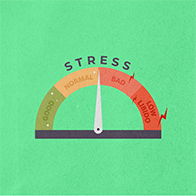Stress Addiction Can Prove Harmful

Even if the effort feels futile, most of us try to reduce stress when we feel it. Stress makes us irritable, inhibits sleep and increases the risk of various acute and chronic health conditions, such as acne, headaches, irritable bowel syndrome and high blood pressure. Chronic and severe stress can even elevate your risk of death.
However, some people feel stress isn't something to be eschewed but savored. The thinking goes that despite its adverse effects, stress can be motivating—and addictive.
If you wear your stress like a badge of honor and seek intensity when overwhelmed, experts say you might have a problem.
What is stress?
Stress is a biological process integral to human evolution. Without it, we likely wouldn't be here, as prehistoric predators would've gobbled up human ancestors without as much as a whimper.
When faced with a threat or perceived threat, the "fight-or-flight response" engages. During this automatic physiological reaction, the body pumps stress hormones such as cortisol and adrenaline, turns off nonessential functions, funnels blood to the brain and muscles, and accelerates breathing and heart rate, preparing us to combat or evade danger.
Most folks don't need fight-or-flight reactions in day-to-day life, but this innate response can be triggered in various situations, including public speaking, fast-approaching deadlines, traffic congestion and family arguments.
When does stress become chronic?
Stress isn't solely beneficial as a survival mechanism. In small doses, it can be motivating and enervating; it may even boost memory. However, problems arise when stress is prolonged or overwhelming, or both.
"Stress is usually a result of forecasting something in your life and the worry or anxiety associated with the thought of what might occur," said Steven Ramos, Ph.D., L.C.S.W., the assistant clinical director at American Addiction Centers in Tampa, Florida. "The mind can't determine if it's real or perceived stress without seeking evidence to support whether or not the threat is true. We are more likely to be stressed if we're operating on emotion. If we're using rationale and logic, we are less likely to be stressed."
To a certain extent, whether stress is an issue depends on the person, as individuals can respond to identical stressors in completely different ways, Ramos said. Typically, everyday stressors ebb and flow, giving the mind and body a chance to reconfigure between swells. These stressors don't significantly impair a person's life, whereas chronic or extreme stress feels more like a tsunami.
"Everyday stress does not cause a great deal of impairment to your life, whereas chronic stress will wreak havoc and could impact work performance, disrupt your interpersonal life, lead to physical symptoms, and impact your appetite and sleep," Ramos said.
What causes stress addiction?
Stress activates the arousal and attention centers in the brain, producing a natural high. It's why people can become euphoric when riding a roller coaster, explained Thomas Jameson, a mental health counselor and the clinical director at the Ohana Addiction Treatment Center in Kailua-Kona, Hawaii. Over time, people with chronic stress can become accustomed to living with higher-than-usual stress hormone levels. Eventually, this status becomes their new normal.
When stress hormone levels drop, a person who's addicted might feel unfulfilled and habitually seek to reinstate the high, despite any adverse effects.
"Addictions of any kind occur when an individual relies on or needs an outside influence to help them manage their emotional, mental and/or physical state," said Bethany Cook, a clinical psychologist in Chicago and author of "For What It's Worth: A Perspective on How to Thrive and Survive Parenting Ages 0-2." "Stressful situations can create a sensation of feeling high regardless of whether the stress is positive or negative. Stress motivates individuals, and sometimes people rely on this 'motivation juice' to help them get everything done."
Several factors can increase a person's likelihood of developing stress addiction, according to Stacey Wright, a psychotherapist at Perspectives Center for Holistic Healing in Tucker, Georgia. These factors include culture, personality, emotional regulation skills and a history of stressful experiences.
Common traits Wright observes in clients dealing with stress addiction include perfectionism, low self-esteem, lack of social support and unresolved trauma or grief. Many have highly demanding jobs, inadequate coping skills, a lack of self-care and beliefs that connect self-worth to feelings of stress.
Aside from the influence on cognitive and emotional development, Cook said growing up in a high-stress household can increase the risk of stress addiction because it imprints the feeling that stress is normal.
"As adults, we often seek out and recreate situations that feel 'normal' even if it's harmful to us because familiarity is interpreted as safe, even when it is toxic," she said. "This is why therapy is so important. It helps individuals create new normals."
The U.S. culture of constant hustle, where productivity is a priority and busyness equals respectability, isn't helpful, either. Even before the pandemic, a 2018 Gallup poll of 151,000 people in 140 countries indicated that 55 percent of Americans reported feeling highly stressed the day before being polled, compared with a global average of 35 percent. In addition, 45 percent of Americans said they felt "worried a lot of the day."
When and how to get help
As with any addiction, the first step to recovery is acknowledging you have a problem. Experts recognize an addiction to stress if you:
- Crave stress
- Feel anxious in calm or low-stress environments
- Feel agitated or on edge when you're not stressed
- Feel numb or unfulfilled when you're not stressed
- Experience adverse effects of stress-seeking behaviors
If you think you might be addicted to stress, Cook suggested first identifying why you're drawn to stress. Then think of healthy alternatives to fill the void created when you stop using stress to meet your needs.
"The most important thing to remember when replacing old coping strategies with new ones is to not substitute one addiction for another," she noted.
Some positive substitutes she recommended include taking up a hobby, exercising, volunteering or adopting a pet. She also suggested trying techniques for reducing stress such as mindfulness, deep breathing, meditation, regular self-care, setting healthy boundaries and joining support groups.
To address the root of your stress addiction, experts recommend therapies such as acceptance and commitment therapy (ACT), mindfulness-based cognitive therapy (MBCT), dialectical behavioral therapy (DBT) and cognitive behavioral therapy (CBT). Speak to your primary healthcare provider to begin discussions about therapies that might work best for you.




















